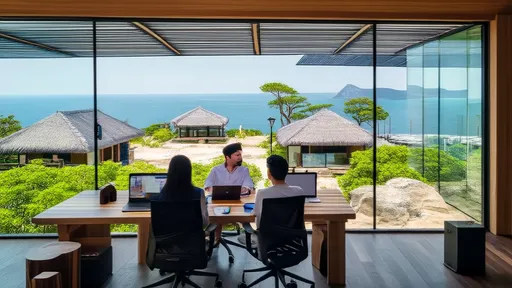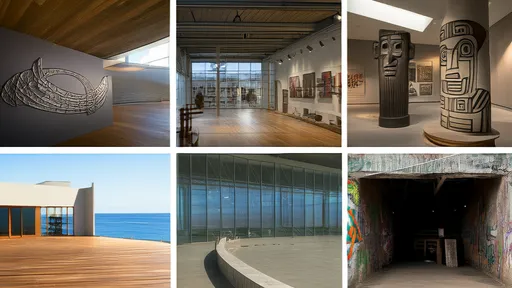In recent years, the concept of digital nomadism has taken the world by storm, with remote workers seeking destinations that offer both productivity and an enviable lifestyle. South Korea’s Jeju Island has emerged as a frontrunner in catering to this growing demographic, thanks to its innovative "Digital Nomad Village" initiative. Blending cutting-edge infrastructure with breathtaking natural beauty, Jeju is fast becoming a hotspot for professionals who refuse to choose between work and wanderlust.
Nestled in the heart of East Asia, Jeju Island has long been a favorite vacation spot for Koreans and international tourists alike. Its volcanic landscapes, pristine beaches, and mild climate make it an ideal escape from urban congestion. But what sets Jeju apart from other tropical destinations is its deliberate effort to transform itself into a hub for location-independent workers. The local government, in collaboration with tech companies and co-working space operators, has rolled out a comprehensive ecosystem designed to support digital nomads for both short and extended stays.
The Digital Nomad Village isn’t confined to a single location but rather spans multiple zones across the island, each offering distinct advantages. In Jeju City, nomads will find high-speed internet cafes, modern co-working spaces, and networking events tailored to international professionals. Meanwhile, the southern coastal areas provide a more relaxed atmosphere, where one can work with ocean views before heading out for a sunset hike along Olle trails. This geographic flexibility allows visitors to curate their ideal work-life balance, whether they thrive in urban energy or seaside serenity.
What truly makes Jeju’s offering unique is its visa support system. While many countries still grapple with immigration policies for digital nomads, South Korea introduced the "Workation Visa" specifically for Jeju Island, permitting stays of up to one year for qualified remote workers and freelancers. This official recognition of the digital nomad lifestyle removes the bureaucratic hurdles that often force nomads to constantly uproot themselves. Combined with Jeju’s existing visa-free entry for many nationalities, the island has positioned itself as one of Asia’s most accessible nomad destinations.
The infrastructure extends beyond just workspaces. Jeju’s nomad community benefits from specially arranged housing solutions that range from budget-friendly guesthouses to premium serviced apartments, all vetted for reliable internet connectivity. Local businesses have adapted too, with cafes displaying download/upload speeds alongside their menu boards and restaurants offering "digital nomad lunch specials" complete with power outlets at every table. These small but thoughtful touches demonstrate how deeply the island has embraced its new role as a workplace paradise.
Cultural integration forms another cornerstone of Jeju’s appeal. Unlike some nomad hotspots where foreign workers remain in expat bubbles, Jeju’s program emphasizes meaningful local connections. Weekly language exchange meetups, traditional craft workshops, and farm-to-table dining experiences with Jeju’s famous haenyeo (female divers) create opportunities for genuine cultural immersion. Many nomads report forming lasting friendships with Jeju residents, something rarely achieved in transient digital communities.
Of course, no discussion of Jeju would be complete without mentioning its natural wonders – which double as the ultimate workplace perks. Imagine taking a conference call from a seaside cliff at Yongmeori Coast, brainstorming sessions in the mystical Gotjawal forests, or unwinding after work in the mineral-rich waters of Sanbangsan Hot Springs. The island’s compact size means even weekend explorers can experience UNESCO-listed sites, volcanic craters, and hidden beaches without extensive travel. This accessibility to nature provides the perfect counterbalance to screen time, a crucial factor in preventing remote work burnout.
The community aspect has flourished organically as more nomads discover Jeju’s potential. Regular skill-sharing workshops, beach cleanups, and entrepreneurial pitch events have created a sense of collective purpose beyond individual work goals. During peak seasons, the nomad population reaches critical mass, resulting in vibrant collaborations between designers, developers, writers, and other creatives who might have never crossed paths in their home countries. This professional cross-pollination has led to startup incubators and creative projects uniquely rooted in Jeju’s environment.
Challenges remain, as with any emerging nomad destination. Some workers report difficulties with language barriers outside tourist areas, while others note that Jeju’s relatively high cost of living (by Asian standards) requires careful budgeting. Winter months bring strong winds that can disrupt ferry schedules and outdoor plans. However, the local government has shown remarkable responsiveness to feedback, continuously refining services based on nomad experiences. Recent improvements include expanded English-language signage, coworking space subsidies during off-peak seasons, and partnerships with local telecoms to provide affordable SIM cards with unlimited data.
As the world reevaluates traditional office culture, Jeju Island’s Digital Nomad Village offers a compelling blueprint for the future of work. It demonstrates how destinations can leverage their natural assets while investing in the infrastructure and community-building that nomadic professionals require. More than just a picturesque backdrop for laptop work, Jeju provides an ecosystem where productivity and quality of life enhance each other. For those tired of choosing between career ambitions and the call to explore, this volcanic island in the Korea Strait might just represent the perfect middle ground – where one can chase deadlines and sunsets in equal measure.
The Jeju model raises intriguing questions about the future of travel and employment. As other destinations scramble to attract remote workers, they would do well to study how Jeju has integrated digital nomadism into its cultural and economic fabric rather than treating it as a passing trend. With its mix of technological readiness, natural splendor, and genuine hospitality, Jeju Island isn’t just riding the digital nomad wave – it’s helping to shape what comes next.

By /Aug 5, 2025

By /Aug 5, 2025

By /Aug 5, 2025

By /Aug 5, 2025

By /Aug 5, 2025

By /Aug 5, 2025

By /Aug 5, 2025

By /Aug 5, 2025

By /Aug 5, 2025

By /Aug 5, 2025

By /Aug 5, 2025

By /Aug 5, 2025

By /Aug 5, 2025

By /Aug 5, 2025

By /Aug 5, 2025

By /Aug 5, 2025

By /Aug 5, 2025

By /Aug 5, 2025

By /Aug 5, 2025

By /Aug 5, 2025